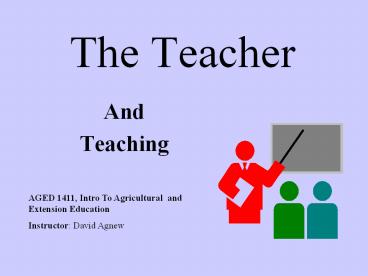The Teacher - PowerPoint PPT Presentation
1 / 31
Title:
The Teacher
Description:
The Teacher And Teaching AGED 1411, Intro To Agricultural and Extension Education Instructor: David Agnew The age old question Is teaching an art or a science? – PowerPoint PPT presentation
Number of Views:137
Avg rating:3.0/5.0
Title: The Teacher
1
The Teacher
- And
- Teaching
AGED 1411, Intro To Agricultural and Extension
Education Instructor David Agnew
2
The age old question
- Is teaching an art
- or a science?
3
Objectives
- Identify 10 Characteristics of teachers (Chapter
8, page 133-134-135). - Identify 10 abilities needed by Agriculture
teachers (Chapter 8, page 137-140) - Describe 10 ways that a teacher can continue to
grow professionally (Chapter 8, 141). - List the individuals or groups to whom a teacher
is responsible. - State the two major responsibilities of a
teacher. - List three things teachers must do to be a
success. - Describe the four stages of teacher development
- Identify the positive traits of a good teacher.
4
Characteristics of Teachers
Phipps, Lloyd J. Handbook on Agricultural
Education in Public Schools. Danville, Illinois
The Interstate Printers Publishers, Inc. Text
Pages 134-135
5
Abilities needed by Agriculture Teachers
- Phipps, Lloyd J. Handbook on Agricultural
Education in Public Schools. Danville, Illinois
The Interstate Printers Publishers, Inc. - Text page 138-140
6
Ways that a teacher can continue to grow
professionally?
7
The individuals or groups to whom a teacher is
responsible
- A. Student
- B. Parents
- C. School (Administration Board)
- D. Community
- E. Profession
- F. Self and family
- G. and.
8
Two major responsibilities of a teacher
- To Know what to teach.
- Curriculum planning
- Content selection
- Selecting text books
- Sequencing the content
- To know how to teach.
- Methods and techniques
- Understanding students and how to manage the
classroom.
9
Three things teachers must do to be a success
- Have positive expectations of the outcomes
- Good at classroom management
- Know how to design lessons that will help
students learn - Note page 42 of Wongs Book (Expectations)
- Harry Wong, To be an effective teacher The first
Days of School, 1998
10
Who is Harry Wong?
11
Four stages of teacher development
- Fantasy
- Survival
- Mastery
- Impact
12
Fantasy
- All they need to do is relate, have fun with the
students, be there for them, be their friends,
Identify with them. - Refer to the note on the handout about being a
pal. - They are not going to be like the teachers they
had in school.
13
Survival
- Just make it through the day, learning is out the
window, Put in your time and get on with my life,
look to the weekend and look forward to a
paycheck, busy work is in, - they revert to the practices they condemned
before they started teaching, they make excuses
for why students dont learn. - Attitude is negative
14
Mastery
- They have a command of the subject matter and
they are going to get it over to students. - They know how to control the classrooom and they
know what to do when something does not work--
Try something else. willing to learn - Not interested in deadend activities.
- I can make a difference,
- Hopeful, Positive attitude
15
Impact
- Teachers have a positive impact on students, uses
variety of methods and techniques to make a
positive impact/change. - Apply the knowledge they have in a way that
results in the most benefit to students. - Sometimes more questions are rasied than are
ask!!!!
16
Good News
- You can get through the first two stages quickly
and move on to the mastery and Impact stage,
sooner if you know what to do. - First few days of school are the most important.
17
Quotes
- Heres the biggest secret to teaching success
- Beg, Borrow and Steal..
- .Ideals
18
The first year can be frightening
- Teacher education will not have prepared you
- Student teaching will not have prepared you
- The district may not have prepared you.
- Yet you will be expected to perform immediately
19
The End
20
What to teach?
- State Competences list (frameworks)
- Students are tested based on the frameworks.
- School May have expectations for what to teach
- The community has expectations
- Alumni, Ag Leaders, Advisory, etc.
- The teachers has some say
- Even students to a small extent can have input
into what is taught in the ag classroom
21
State Competences or Frameworks BACK
- http//dwe.arkansas.gov/CurriculumFrameworks/CGAgr
i.htm
AquacultureBiological Animal ScienceBiological
Plant ScienceEnvironmental Resources Soil
WaterFloricultureFood Science
TechnologyForestryGreenhouse ManagementIntroduc
tion to HorticultureIntroduction to World
Agricultural ScienceLeadership and
CommunicationsManaging Natural
ResourcesNursery/LandscapePlant ScienceSmall
Engine TechnologyTurf Grass Management
Agricultural BusinessAgricultural
ElectricityAgricultural GraphicsAgricultural
MarketingAgricultural Mechanics I Agricultural
Mechanics IIAgricultural Metals IAgricultural
Metals IIAgricultural Power Systems
IAgricultural Power Systems II Agricultural
Structural Systems IAgricultural Structural
Systems IIAgriculture ScienceAgriculture
Science and TechnologyAgriculture
SurveyingAnimal Science
22
How to teach?
- What is a method of teaching?
- What is the difference in a methods and a
technique? - Name five methods of teaching
- Presentation
- Discussion
- Supervised study
- Job Instruction
- Cooperative learning
23
Common Methods of Teaching
- Lecture
- Teacher lead discussion
- Computer activity
- Video
- Field trip
- Demonstration
- Panel
- Project
- Guest Speaker
- Problem solving
- Learning by doing
- Hands-on activities
24
(No Transcript)
25
(No Transcript)
26
(No Transcript)
27
(No Transcript)
28
(No Transcript)
29
(No Transcript)
30
Then the Organizational Process
- Lesson Plans
- Teaching Plan
- Teaching and Learning plans
- Difference in a lesson plan and a unit plan?
31
Parts of a Lesson Plan
- See Sample
- See Description
- Back































